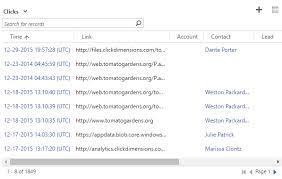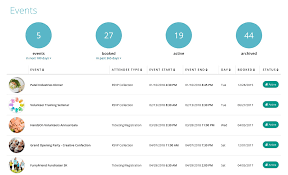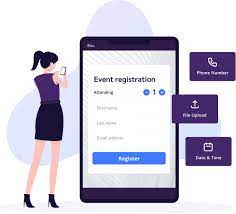In today’s fast-paced digital age, organizing events has become more streamlined and efficient thanks to the advent of online event registration software. This innovative technology has revolutionized the way event planners manage registrations, making the process seamless and hassle-free for both organizers and attendees.
Gone are the days of paper registration forms and manual data entry. Online event registration software offers a user-friendly platform that allows participants to register for an event conveniently from anywhere in the world, at any time. With just a few clicks, attendees can secure their spot, select their preferred sessions or workshops, and even make payments online.
One of the key advantages of using online event registration software is its ability to automate various administrative tasks. Organizers can easily create customized registration forms tailored to their specific event requirements. These forms can collect essential information such as participant details, dietary preferences, accommodation needs, and more. The software then automatically compiles this data into a centralized database, eliminating the need for manual data entry and reducing the risk of errors.
Furthermore, online event registration software simplifies payment processes by integrating secure payment gateways. Attendees can choose from various payment options such as credit cards or online banking transfers, making it convenient for them to complete transactions without any hassle. Organizers can also set up tiered pricing structures or offer promotional codes to incentivize early registrations or provide discounts to specific groups.
Another valuable feature of online event registration software is its ability to generate real-time reports and analytics. Organizers can access comprehensive data on attendee demographics, ticket sales, session popularity, and more. This information enables them to make informed decisions regarding event logistics, marketing strategies, and future planning.
Moreover, online event registration software often includes features like automated email confirmations and reminders. Attendees receive instant confirmation emails upon successful registration along with important event details such as dates, times, venue information, and personalized itineraries. Automated reminders before the event help ensure participants don’t miss out on any important updates.
Additionally, many online event registration software platforms offer seamless integration with other event management tools such as event websites, mobile apps, and CRM systems. This integration allows organizers to create a cohesive and efficient event experience for both themselves and their attendees.
In conclusion, online event registration software has revolutionized the way events are organized. Its user-friendly interface, automation capabilities, secure payment options, robust reporting features, and seamless integrations make it an invaluable tool for event planners. By simplifying the registration process and streamlining administrative tasks, this technology empowers organizers to focus on creating exceptional events while providing attendees with a convenient and hassle-free registration experience.
7 Common Questions About Online Event Registration Software Answered
- What features does the software offer?
- Is the software user-friendly?
- How secure is the online event registration process?
- Does the software integrate with existing systems?
- What customer support options are available?
- How much does it cost to use the software?
- How easy is it to set up and manage events using the software?
What features does the software offer?
Online event registration software offers a wide range of features designed to simplify the event management process. Here are some common features you can expect to find:
- Customizable Registration Forms: The software allows organizers to create personalized registration forms tailored to their event’s specific needs. This includes collecting attendee information such as names, contact details, preferences, and any additional custom fields.
- Secure Payment Processing: Integration with secure payment gateways enables attendees to make online payments using various methods, such as credit cards or online banking transfers. The software ensures that transactions are safe and encrypted.
- Ticketing and Pricing Options: Event organizers can set up different ticket types with varying prices, discounts, early bird offers, or promotional codes. Attendees can select their desired ticket type and complete the registration process accordingly.
- Session Selection: For events with multiple sessions or workshops, the software allows attendees to choose their preferred sessions during the registration process. This feature helps manage session capacities and ensures participants get access to their desired sessions.
- Automated Email Communication: The software sends automated confirmation emails upon successful registration, providing attendees with important event details and receipts. It can also send reminders leading up to the event, keeping participants informed.
- Reporting and Analytics: Comprehensive reporting tools provide organizers with real-time data on attendee demographics, ticket sales, revenue generation, session popularity, and more. These insights help in making data-driven decisions for future events.
- Mobile-Friendly Interface: Many online event registration software platforms offer mobile-responsive designs or dedicated mobile apps for easy access and registration on smartphones or tablets.
- Integrations: The software often integrates with other event management tools like CRM systems, email marketing platforms, survey tools, badge printing solutions, or attendee engagement apps for a seamless end-to-end event management experience.
- Data Management: Organizers can efficiently manage attendee data by storing it securely in a centralized database accessible from anywhere at any time. This eliminates the need for manual data entry and reduces the risk of errors.
- Onsite Check-In: Some software solutions offer onsite check-in features, allowing organizers to streamline the registration process by scanning QR codes or checking attendees in manually using mobile devices or dedicated check-in stations.
These are just a few examples of the features commonly found in online event registration software. The specific features may vary depending on the software provider, so it’s essential to research and choose a platform that aligns with your event’s requirements.
Is the software user-friendly?
Yes, online event registration software is designed to be user-friendly. The interfaces are typically intuitive and easy to navigate, ensuring that both organizers and attendees can easily access and use the software without any technical expertise. The registration process is typically straightforward, with clear instructions and prompts guiding users through each step. Additionally, many software providers offer customer support and resources to assist users in case they encounter any difficulties or have questions. Overall, the goal of online event registration software is to simplify the registration process and make it accessible to all users, regardless of their technical proficiency.
How secure is the online event registration process?
The security of the online event registration process is a top priority for event registration software providers. They employ various measures to ensure the protection of sensitive data and maintain the privacy and confidentiality of attendees’ information.
Firstly, reputable event registration software platforms utilize secure socket layer (SSL) encryption technology. This encryption protocol ensures that all data transmitted between the attendee’s device and the registration platform remains encrypted and cannot be intercepted or accessed by unauthorized parties.
Secondly, these platforms implement strict access controls to safeguard attendee data. This includes limiting access to authorized personnel only and implementing strong authentication measures such as unique login credentials and multi-factor authentication.
Furthermore, event registration software providers adhere to industry-standard security practices and comply with relevant data protection regulations, such as the General Data Protection Regulation (GDPR) in the European Union. They have robust data protection policies in place to ensure that personal information is handled securely, stored safely, and used only for legitimate purposes related to the event.
Moreover, reputable event registration software platforms often undergo regular security audits and vulnerability assessments to identify and address any potential vulnerabilities or weaknesses in their systems. They also employ advanced firewalls, intrusion detection systems, and other security mechanisms to protect against unauthorized access or malicious attacks.
It is important for organizers to choose a trusted event registration software provider with a proven track record in ensuring data security. Reading reviews, checking certifications, and conducting due diligence can help organizers make an informed decision about which platform to use.
While event registration software providers take significant measures to enhance security, it’s essential for organizers and attendees to play their part as well. This includes using strong passwords, avoiding sharing login credentials with others, being cautious of phishing attempts or suspicious links, and keeping their devices protected with up-to-date antivirus software.
By taking these precautions and partnering with reputable event registration software providers who prioritize security, organizers can have confidence in the safety of their attendees’ data throughout the online event registration process.
Does the software integrate with existing systems?
Yes, many online event registration software platforms offer integrations with existing systems. These integrations allow for seamless data flow and synchronization between the event registration software and other tools or systems that organizers may already be using.
Common integrations include customer relationship management (CRM) systems, email marketing platforms, event websites, mobile apps, and payment gateways. By integrating with a CRM system, for example, event organizers can automatically sync attendee data from the registration software to their CRM database, ensuring that all participant information is up to date and easily accessible.
Integration with email marketing platforms enables organizers to seamlessly import attendee lists for targeted communication and marketing campaigns. This ensures that attendees receive relevant updates and reminders leading up to the event.
Furthermore, integration with event websites allows organizers to embed registration forms directly on their website, providing a seamless user experience for potential attendees. This eliminates the need for participants to navigate to a separate registration page or platform.
Some online event registration software also offers integration with mobile apps. This allows organizers to provide attendees with a dedicated event app that includes features such as personalized schedules, session details, networking opportunities, and more. The app can sync with the registration software in real-time, ensuring attendees have access to the most up-to-date information.
Additionally, integration with payment gateways enables secure online transactions and allows organizers to easily track and manage payments within the registration software itself. This streamlines financial processes and provides a convenient experience for both organizers and attendees.
It’s important to note that integration capabilities may vary depending on the specific online event registration software platform chosen. Organizers should review the available integrations offered by different providers to ensure compatibility with their existing systems and desired functionality.
What customer support options are available?
At Haaga Exhibits, we prioritize providing excellent customer support to ensure your satisfaction. We offer various customer support options to address any inquiries or concerns you may have.
- Email Support: You can reach out to our dedicated customer support team via email at support@haagaexhibits.com. Whether you have questions about our services, need assistance with a specific issue, or require further information, our team is ready to assist you promptly.
- Phone Support: We understand the importance of direct communication, so we provide phone support during business hours. You can call our customer support hotline at [+1-XXX-XXX-XXXX] to speak with a knowledgeable representative who will be happy to assist you and provide guidance.
- Live Chat: If you prefer real-time interaction and quick responses, our website offers a live chat feature. Simply visit haagaexhibits.com and look for the chat icon in the bottom corner of the screen. Our friendly customer support agents will be available to answer your questions and provide immediate assistance.
- FAQs and Knowledge Base: To address common queries and provide self-help resources, we maintain an extensive FAQs section and knowledge base on our website. Here, you can find answers to frequently asked questions about our services, processes, pricing, and more.
- Social Media Channels: Stay connected with us through our social media channels such as Facebook, Twitter, and Instagram. We actively monitor these platforms so that we can respond quickly to any messages or comments you may have.
- Online Contact Form: If you prefer a written method of communication, you can fill out the contact form on our website’s “Contact Us” page. Provide details about your query or concern, and our customer support team will get back to you via email as soon as possible.
We are committed to providing exceptional customer service throughout your journey with Haaga Exhibits. No matter which support option you choose, we are here to assist you and ensure that your experience with us is smooth, efficient, and satisfactory.
How much does it cost to use the software?
The cost of using online event registration software can vary depending on several factors, including the specific features and functionality you require, the number of attendees or registrations you anticipate, and the duration of your event. Different software providers offer various pricing models to cater to different needs.
Some online event registration software providers offer tiered pricing plans based on the number of registrations or attendees. They may have different packages with varying features and limitations, allowing you to choose the one that best suits your requirements and budget.
Other providers may charge a flat fee per event or a monthly/annual subscription fee that grants access to their software and services. This type of pricing structure often includes additional features such as email marketing, reporting analytics, integrations with other tools, customer support, and more.
It’s important to carefully evaluate your specific needs and compare different software providers to find the one that offers the best value for your budget. Some providers also offer free trials or demo versions of their software, allowing you to test out its functionality before making a commitment.
Remember that while cost is an important factor to consider, it’s equally crucial to assess the quality, reliability, ease of use, customer support, and overall suitability of the software for your event management needs.
How easy is it to set up and manage events using the software?
Setting up and managing events using online event registration software is typically designed to be user-friendly and straightforward. The software providers understand the importance of efficiency and ease-of-use for event organizers. Here are some key points that highlight the simplicity of setting up and managing events using this software:
- Setup Process: The setup process is generally intuitive, with step-by-step guidance provided by the software. Organizers can create an event by filling in essential details such as event name, date, time, location, ticket types, and pricing options. Many platforms offer customizable templates or pre-built forms to simplify the setup process further.
- Registration Form Customization: Online event registration software allows organizers to create customized registration forms tailored to their specific needs. Drag-and-drop interfaces enable easy form building, where organizers can add or remove fields as required. This flexibility ensures that organizers can collect all necessary information from attendees.
- Payment Options: Integrating secure payment gateways within the software makes it convenient for attendees to make payments online. Organizers can set up various payment options like credit cards, PayPal, or other preferred methods. The software handles the transaction securely and provides real-time updates on successful payments.
- Attendee Management: Event registration software provides a centralized database where organizers can easily manage attendee information. They can view and access participant details, track registrations in real-time, make edits if needed, and generate reports on attendee demographics or other relevant data.
- Communication Tools: Many event registration platforms offer built-in communication tools such as automated email confirmations and reminders for registered attendees. This feature helps keep participants informed about important updates or changes related to the event.
- Reporting and Analytics: The software typically offers robust reporting capabilities that provide valuable insights into ticket sales, attendee demographics, session popularity, revenue generation, and more. These reports help organizers make data-driven decisions regarding event planning and marketing strategies.
- Integration with Other Tools: Online event registration software often integrates seamlessly with other event management tools like event websites, mobile apps, CRM systems, or email marketing platforms. This integration ensures a cohesive and efficient experience for organizers and attendees.
While the ease of setup and management may vary slightly depending on the specific software provider, the overall goal is to simplify the process for event organizers. Most online event registration software aims to provide a user-friendly interface, intuitive features, and comprehensive support to ensure that organizers can set up and manage events with ease and efficiency.



